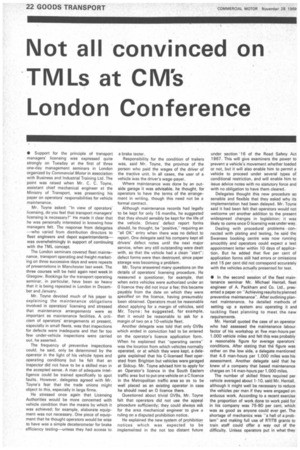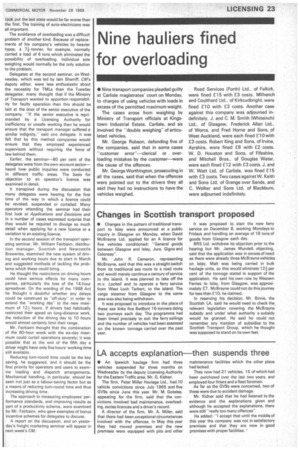Not all convinced on TMLs at CM'S London Conference
Page 24

Page 25

If you've noticed an error in this article please click here to report it so we can fix it.
• Support for the principle of transport managers licensing was expressed quite strongly on Tuesday at the first of three one-day management seminars in London organized by Commercial Motor in association with Business and Industrial Training Ltd. The point was raised when Mr. C. C. Toyne, assistant chief mechanical engineer at the Ministry of Transport, was presenting his paper on operators' responsibilities for vehicle maintenance.
Mr. Toyne asked: "In view of operators' licensing, do you feel that transport managers' licensing is necessary?" He made it clear that he was personally interested in knowing how managers felt. The response from delegates —who varied from distribution directors to fleet engineers and depot superintendents— was overwhelmingly in support of continuing with the TML concept.
The London seminars covered fleet maintenance, transport operating and freight marketing on three successive days and were repeats of presentations in Manchester last week. The three courses will be held again next week in Glasgow. Bookings for the transport operating seminar, in particular, have been so heavy that it is being repeated in London in December and January.
Mr. Toyne devoted much of his paper to explaining the maintenance obligations involved in operators' licensing and stressed that maintenance arrangements were as important as maintenance facilities. A criticism of operators' arrangements at present, especially in small fleets, was that inspections for defects were inadequate and that far too few under-vehicle inspections were carried out, he asserted.
The frequency of preventive inspections could, he said, only be determined by the operator in the light of his vehicle types and operating conditions but he felt that an inspector did not have to be a skilled man in the accepted sense. A man of adequate intelligence could be trained specifically to spot faults. However, delegates agreed with -Mr. Toyne's fear that the trade unions might object to this, especially in large firms.
He stressed once again that Licensing Authorities would be more concerned with vehicle condition than the means by which it was achieved; for example, elaborate equipment was not necessary. One piece of equipment that he thought operators would be wise to have was a simple decelerometer for brake efficiency testing—unless they had access to a brake tester.
Responsibility for the condition of trailers was, said Mr. Toyne, the province of the person who paid the wages of the driver of the tractive unit. In all cases, the user of a vehicle Was the driver's wage-payer.
Where maintenance was done by an outside garage it was advisable, he thought, for operators to have the terms of the arrangement in writing, though this need not be a formal contract.
Although maintenance records had legally to be kept for only 15 months, he suggested that they should sensibly be kept for the life of the vehicle. Drivers' defect report forms should, he thought, be "positive," requiring an "all OK" entry when there was no defect to report. One delegate said his company kept all drivers' defect notes until the next major service, when any still outstanding were dealt with, so that the vehicle had a clean "start"; defect forms were then destroyed, since paper storage was becoming a problem.
Mr. Toyne answered many questions on the details of operators' licensing procedure. He reassured a questioner, for example, that when extra vehicles were authorized under an 0 licence they did not incur a fee; this became payable from the date on which they were specified on the licence, having presumably been obtained. Operators must be reasonable about applying for a margin of vehicles, said Mr. Toyne: he suggested, for example, that it would be reasonable to ask for a margin of two on a 10-vehicle fleet.
Another delegate was told that only GV9s which ended in conviction had to be entered on the operator's licence application form. When he explained that "operating centre" was the location from which vehicles normally operated, or at which they were kept, a delegate explained that his C-licensed fleet operated from Brighton but vehicles were garaged at Sidcup. Mr. Toyne advised him to apply far an Operator's licence in the South Eastern traffic area but to put one vehicle on a C licence in the Metropolitan traffic area so as to be well placed as an existing operator in case he should need an 0 licence there.
Questioned about trivial GV9s, Mr. Toyne felt that operators did not use the appeal procedure sufficiently; they could always ask for the area mechanical engineer to give a ruling on a disputed prohibition notice.
He explained the new system of prohibition notices which was expected to be implemented in the not too distant future under section '16 of the Road Safety Act 1967. This will give examiners the power to prevent a vehicle's movement whether loaded or not, but it will also enable him to permit a vehicle to proceed under several types of conditional restriction, and will enable him to issue advice notes with no statutory force and with no obligation to have them cleared.
Delegates thought this new procedure so sensible and flexible that they asked why its implementation had been delayed. Mr. Toyne said it had been felt that operators would not welcome yet another addition to the present widespread changes in legislation: it was likely to come once 0 licensing was under way.
Dealing with procedural problems connected with plating and testing, he said the Swansea booking centre was now running smoothly and operators could expect a test appointment letter within 10 days of application. But he added that five per cent of application forms still had errors or omissions and 15 per cent did not correspond accurately with the vehicles actually presented for test.
• In the second session of the fleet maintenance seminar Mr. Michael Hentall, fleet engineer of A. Packham and Co. Ltd., presented a paper on "Achieving results by planned preventive maintenance". After outlining planned maintenance, he detailed methods of setting up a system anti operating it and tackling fleet planning to meet the new requirements.
Mr. Hentall quoted the case of an operator who had assessed the maintenance labour factor of his workshop at five man-hours per 1,000 vehicle miles and felt this was probably a reasonable figure for average operators' conditions. After stating that the figure was rather on the low side, a delegate mentioned that 4.6 man-hours per 1,000 miles was his assessment. Another delegate said that he knew of a company that based maintenance charges on 14 man-hours per 1,000 miles.
The number of skilled fitters required per vehicle averaged about 1-10, said Mr. Hentall, although it might well be necessary to reduce the vehicles per man if they were engaged on arduous work. According to a recent exercise the proportion of work done to work paid for in his company was 75-80 per cent, which was as good as anyone could ever get. The shortage of mechanics was "a hell of a problem" and making full use of RTITB grants to train staff could offer a way out of the difficulty. Unless operators put in what they took out the last state would be far worse than the first. The training of auto-electricians was all important.
The avoidance of overloading was a difficult problem of another kind. Because of replacements of his company's vehicles by heavier types, a 71-tormer, for example, normally carried a load of 6 tons which eliminated the possibility of overloading. individual axle weighing would normally be the only solution to the problem.
Delegates at the second seminar, on Wednesday, which was led by lain Sherriff. CM's deputy editor, were less enthusiastic about the necessity for TMLs than the Tuesday delegates; many thought that if the Ministry of Transport wanted to apportion responsibility for faulty operation then this should be laid at the door of the senior executive of the company. "If the senior executive is reprimanded by a Licensing Authority for inefficiency or unsafe working then he would ensure that the transport manager suffered a similar indignity," said one delegate. It was felt that by this method companies would ensure that they employed experienced supervisors without requiring the force of law behind them.
Earlier, the seminar-80 per cent of the delegates were from the own-account sector— heard how public inquiries were conducted in different traffic areas. The basis for objection to an operator's licence was examined in detail.
It transpired during the discussion that many delegates were hearing for the first time of the way in which a licence could be revoked, suspended or curtailed. Many operators attending the seminar had their first look at Applications and Decisions and in a number of cases expressed surprise that they would be required to divulge so moch detail when applying for a new licence or a variation to an existing licence.
In the second session of the transport operating seminar, Mr. William Fairbairn, distribution manager, Scottish and Newcastle Breweries, examined the new system of-driving and working hours due to start in March and suggested methods of tackling the problems which these could bring.
He thought the restrictions on driving hours could have serious effects for many companies, particularly the loss of the 14-hoer spreadover. On the wording of the 1968 Act he thought it doubtful whether any delays could be construed as "off-duty" in order to extend the "working day" to the new maximum of 124hours. If drivers had habitually restricted their speed on long-distance work, the reduction of the driving day to 10 hours would almost certainly limit their range.
Mr. Fairbairn thought that the combination of the 60-hour week with the six-day maximum could curtail operations severely; it was possible that at the end of the fifth day a driver might have only five hours' working time still available.
Reducing turn-round time could be the key saving, he suggested, and it should be the first priority for operators and users to examine loading and dispatch arrangements. Mechanical handling, in particular, should be seen not just as a labour-saving factor but as a means of reducing turn-round time and thus increasing driving time.
The approach to measuring employees' performance standards, and improving results as part of a productivity scheme, were examined by Mr. Fairbairn, who gave examples of bonus incentive schemes for delegates to discuss.
A report on the discussion, and on yesterday's freight marketing seminar will appear in next week's CM.
















































































































